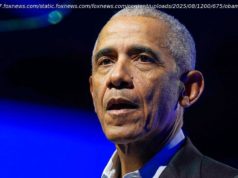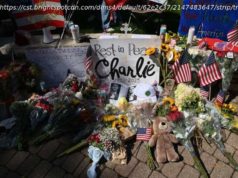Are voters fixated on Trump? Health care? North Korea? Nope. Think again.
If for some unfathomable reason you are planning to follow a congressman through a baking-hot Texas summer, I recommend you choose Will Hurd. He’s personable, mild-mannered, and clearly in command of the issues. Also, he holds many of his town halls in Dairy Queens, so you can cool off with a Blizzard while you wait for the event to start.
Those were not my reasons for visiting Hurd’s district. I went to see Hurd because he’s in the only competitive district in Texas. Running along the southwestern edge of the state, the Texas 23rd has 820 miles of border and a majority-Hispanic population. Hillary Clinton carried it by 3.4 percentage points. Hurd, a Republican, carried it by 1.3 points .
In short, it is that increasing rarity in U. S. politics: a truly competitive political district. Hurd is a moderate Republican, or at least, the closest thing we’ ve got in these days of polarization. His opponents complain that he votes with his party too often, but party unity on congressional votes has been steadily rising for decades, and given the complete dysfunction of Congress in recent years, Hurd, now in his second term, hasn’ t had many opportunities to boldly buck his party on a major policy issue. He’s certainly not one of President Donald Trump’s yes-men.
Hurd was one of the 20 Republicans who voted against the American Health Care Act. At every stop on his town hall tour — charmingly named “DC to DQ” — he had harsh words for the idea of a wall along the Mexican border. And after Trump came out to defend some participants in a white supremacist demonstration, Hurd told CNN: “If you are showing up to a Klan rally you are probably a racist or a bigot. I think the outrage across the political spectrum about this is maybe the thing that ultimately unites us.”
As a former CIA officer, Hurd says that his old job taught him moderation, and respect for the views of all sides. “Being an intelligence officer, ” he said, “you collect information from all sides, and when there’s overlap, that’s usually where the truth is.”
Hurd’s tour in the Texas 23rd is a window into what members of Congress are encountering during this August recess — or “ district work period, ” as lawmakers prefer to call it. Many hold town halls to reconnect with their home states. It’s a very different perspective on national politics than we get back in Washington.
So, tagging along behind Will Hurd, I spent a few days visiting public libraries, coffee shops, Dairy Queens (where I enjoyed my first Blizzard with chunks of Reese’s Peanut Butter Cups) , and, memorably, a sort of dance hall named John T. Floore Country Store. I wanted to hear what a member of Congress was hearing from constituents.
Veterans’ issues — something that almost never make the national conversation unless the Veteran’s Administration has a juicy scandal for us to gape at — loomed much larger in the questioning than health-care reform, which has obsessed the national media for the past nine months. That shouldn’ t really be surprising. The number of veterans in the country is roughly equal to the widely touted figure of 20 million people who gained insurance because of Obamacare.
Obamacare recipients are at best a weak interest group. Many people, especially Medicaid recipients, may not even be aware that Obamacare is the source of their insurance coverage. Moreover, Obamacare disproportionately benefited noncitizens, who cannot vote. Veterans, on the other hand, are well-organized, have their connection with the VA to bind them together as an interest group, and are overwhelmingly eligible to vote.
Veterans’ issues were the most notable way that the local conversation differed from the national one, but far from the only one. I heard more about school policy than climate change, and a great deal about very local issues indeed — problems with asbestos in the water table, a local community college that someone said was doing a poor job of preparing kids for work. In the El Paso leg of the trip, which I didn’ t cover, Hurd says that the conversation was dominated by flooding, as heavy rains had recently filled normally dry arroyos, damaging property and displacing families.
When I asked Hurd whether the local conversation seemed different from the national one, he enthusiastically agreed. “That’s absolutely right, ” he said. What the voters care about can be very different. And ultimately, those voters are Hurd’s boss.
Location Trumps Party
Even on issues that are unmistakably Big National Concerns — notably securing the border — the conversation in Texas was very different from what you hear at the national level. Small towns are Trump country, but here this close to the border, even when the group was predominantly Anglo, I didn’ t hear a lot of support for Trump’s wall.
That’s because for most of the country, the wall is a symbolic commitment to cracking down on people who illegally cross the border. In Hurd’s district, the wall is not symbolic. It is a real and a looming threat. Building it would mean using eminent domain to seize land from local farmers, creating a barrier to wildlife and stock that would wreak havoc with their operations.
Border control already presents problems for these people. I listened to one man relate the tale of a neighbor whose house fire raged out of control because border security had cut them off from the fire department. They sure don’ t want more of it. So rural whites who were probably Republicans, and who in other parts of the country might have been avid fans of the wall idea, nodded and smiled when Hurd said — as he did at every stop — that “a wall is the most expensive and least effective way to handle border security.”
This kind of local knowledge, by the way, illustrates the benefit of having a geographically based election system with single-member districts, rather than nationalized elections run by proportional representation. Coast dwellers who have herded into very liberal cities frequently disparage this system, which hands outsize power to more rural, more conservative voters. But in a country that is 3,000 miles wide, national policies will have widely varying impacts depending on local conditions. If we used proportional representation, much of that local information would be lost to the political system. As it is, the Texas 23rd has a Republican in Congress making a vocal case against the president’s signature promise.
Washington’s Trump Fixation
Trump is almost all Washington thinks about these days. But in the Texas 23rd, his name came up a lot less than I expected, in my interviews and in the questions aimed at Hurd. Voters seemed to have other things on their mind.
Some of those things — like Trump’s proposed border wall, and Education Secretary Betsy DeVos’s support for vouchers — were Trump administration policy. But voters wanted to talk about the policy, not the people behind them.
When I asked Hurd what had changed since Trump’s election, he said the biggest change was not what people were talking about, but simply that more people were coming to the events. Those people were about roughly split between Democrats and Republicans, he observed. And from what I observed, very few of them were interested in debating whether Trump was an existential threat to the republic.
Customer Satisfaction
Hurd does “DC to DQ” every year — with 29 stops in 2017, from El Paso to San Antonio. He says that’s just who he is: “When I ran the first time, people always said they didn’ t see their representatives. ‘Representative’ : that’s my title, and I take that seriously.” Later in our conversation, he added: “I do actually like it. I love road trips, I love the district, I like being with people.”
But it also seems likely that this level of contact gives him an edge in tight races. Even if that’s not why he’s doing it, that may be why his district re-elected him, while pulling the lever for Clinton at the top of the ballot.
In the increasingly common safe districts, the real political action is in the primary, which tends to be dominated by small groups of activist voters who can be assuaged with private contact.






